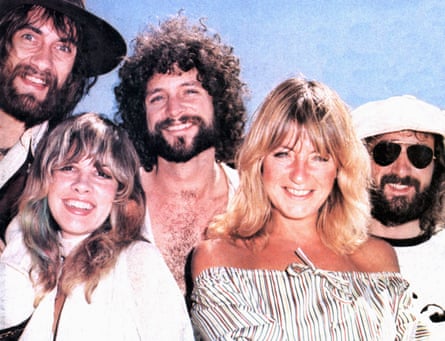According to a handwritten note Stevie Nicks posted on social media on Wednesday, Christine McVie’s bandmates in Fleetwood Mac hadn’t even known she was ill until a few days before her death. “I wanted to be in London; I wanted to get to London,” Nicks lamented. “But I was told to wait.”
It’s a sad story, but it somehow seems very Christine McVie. She gave every impression of being unfailingly modest and understated while playing a vital role in one of the most successful rock bands in history, maintaining a remarkably clear-eyed view of their strengths and failings: she bluntly dismissed the last two albums she made with the band, 1990’s Behind the Mask and 1995’s Time, as “terrible”. She appeared to sail through the soap opera that was Fleetwood Mac in the mid- to late 70s – a broiling mass of failed personal relationships, cocaine-fulled egotism and excess – with such a degree of equanimity that Nicks took to calling her Mother Earth. Somehow, she pulled off the not-inconsiderable feat of seeming to be at one remove from the band’s madness while in reality being in the thick of it.
On 1977’s 45m-selling Rumours, while Nicks and her former partner Lindsey Buckingham wrote one entertainingly bitter song after another about their collapsed partnership, each heaping blame on the other, McVie came up with Don’t Stop, exhorting her ex-husband, bassist John McVie, to look on the bright side of their recent divorce. You could argue that was easy for her to say, given that she wasn’t the one who had to stand on stage every night listening to their ex sing a paean to their new partner (McVie’s You Make Loving Fun). But still, the song suggested its author was possessed of a noticeably different temperament to the people who wrote Dreams or Go Your Own Way. “It was never as melodramatic as Stevie and Lindsey,” she later reflected.
Perhaps it’s more accurate to say that McVie remained an oddly enigmatic character, even after decades in the spotlight. Behind the self-deprecation and the gorgeous tenderness of her vocals, she must have been quite steely. It must have taken some determination to establish yourself as a woman in the testosterone-heavy world of Britain’s late-60s blues revival, but Christine Perfect, as she was then, managed it. When she won Melody Maker magazine’s female singer of the year award in 1969, she pointed out that she wasn’t exactly overburdened with competition: “There was really only Julie Driscoll, Sandy Denny and me at that point – there were no other women.”

It was a typically self-effacing comment that nevertheless told you a lot about the environment in which she first made her mark. Her head turned by the music of Fats Domino, she had already played in a blues band at art college when one of its ex-members invited her to jack in her career as a window-dresser and join his new band, Chicken Shack, in 1967. Although she later said she didn’t know what she was doing – “it didn’t come naturally and I didn’t have any belief in myself” – she contributed a handful of songs to their first two albums, 1968’s 40 Blue Fingers Freshly Packed and Ready to Serve and 1969’s OK Ken?, and sang lead vocals on their biggest hit, a lambent cover of Etta James’s I’d Rather Go Blind, on which she boldly declined to disguise her English accent.
Moreover, she seemed to have her own unique songwriting style in place from the start. Listen to 1968’s When the Train Comes Back, the first released song for which she received a solo writing credit. It’s very much written in the blues idiom – “you got 20 other women and you know another wouldn’t do” – but anyone familiar with Rumours or Tusk would find something oddly familiar about it: there’s a bittersweet melancholy to its melody that feels distinctly McVie. It’s the same with Wait and See, from her 1970 solo album Christine Perfect, which she subsequently dismissed as “pretty rum”. It’s not too much of a mental leap to imagine it slotting on to a mid-70s Fleetwood Mac album, differently arranged and produced: if it wouldn’t be a highlight, nor would it be wildly out of place.
The sense that, contrary to her protestations, McVie knew what she was doing was heightened when she became a member of Fleetwood Mac. The band seem to have asked her to join purely out of necessity. She attended the sessions for 1970’s Kiln House in her capacity as John McVie’s new wife, fulfilling the role that rock stars’ wives tended to fulfil in the era – “doodling, cooking and smoking a lot of pot,” as she put it – but Fleetwood Mac were clearly struggling without their former leader, Peter Green, and McVie happened to be on hand. She made an immediate impact, not least because she appeared to have worked out where their musical future would lie long before anyone else did.
Fleetwood Mac’s early-70s albums were a mixed bag – the sound of a band who aren’t entirely certain what to do next. But whenever McVie takes over the songwriting, you can make out Rumours in embryo form. Tellingly, 1972’s Spare Me a Little of Your Love remained in their live set long after Nicks and Buckingham had joined the band. And it speaks to McVie’s determination that she remained with Fleetwood Mac through these years of meagre sales, lineup changes and widespread lack of interest (a kind of nadir was reached on the 1974 release of Heroes Are Hard to Find, when their manager sent a fake version of the band to tour the US, claiming he owned their name). But perhaps she stuck it out because she could make out a potential destination.
Long before Fleetwood Mac decamped from the UK to Los Angeles, McVie’s songs were touched by west coast sunlight. Popular wisdom and record sales might suggest that Buckingham and Nicks’s recruitment drastically revitalised the band, but it’s worth noting that the song that announced the arrival of Fleetwood Mac 2.0 was, depending on what country you lived in, Warm Ways or Over My Head – both examples of McVie doing what she had already been doing for years: better produced, certainly, and benefiting from the gorgeous blend of voices that was McVie, Buckingham and Nicks singing in harmony, but still immediately identifiable as the work of the woman who had written Spare Me a Little of Your Love.
Just as McVie had been steadfast during the chaos of Fleetwood Mac’s lean early 70s, so she was steadfast amid the personal turmoil that enveloped the group once sales took off. There was the bitter and seemingly unending fallout from Nicks and Buckingham’s split; wild musical experimentation fuelled by a desire to keep up with the late-70s new wave movement; drug addiction so crippling that Nicks later claimed not to remember an entire four-month tour; moments where everyone else in the band seemed lost or uninspired. But McVie reliably turned up to album sessions with a clutch of fantastic songs.
Her contributions to 1979’s Tusk balance and anchor its more outre moments, whether they were implausibly soft and cosseting – Over and Over and Brown Eyes – or gently tethered to her blues roots, as on Think About Me. From 1982, Mirage is the least well-regarded album by the blockbuster iteration of Fleetwood Mac, but there’s very little quibbling about the quality of McVie’s Only Over You – a beautiful, careworn tribute to her ex-boyfriend, Beach Boy Dennis Wilson – or her stately album closer Wish You Were Here (written with Colin Allen). The sessions for 1987’s Tango in the Night were, by all accounts, horrendous – Buckingham banished Nicks and Mick Fleetwood to a Winnebago parked outside the studio, horrified at the state they were in; John’s drinking was so out of control he subsequently began suffering alcohol-related seizures – and yet McVie came up with the peerless Everywhere and Little Lies (co-written with Eddy Quintela), both multi-platinum singles.

The lineup of Fleetwood Mac that recorded Tango in the Night never made another album. Understandably dispirited by the subsequent Behind the Mask and Time, gripped by a fear of flying and keen to return to the UK, McVie left the band in 1998. She released a solo album, In the Meantime, in 2004, her first in 20 years, but she had never seemed terribly invested in a solo career. It was, she said, “not my bag at all, I like to be part of a group”, although her writing never dipped below a certain standard.
Far better was her eponymous 2017 collaborative album with Lindsey Buckingham, home to her beautifully atmospheric Carnival Begin. Now that McVie was touring with Fleetwood Mac again – she rejoined in 2014 – the general belief was that the quality of the Buckingham-McVie album boded well for a full-scale reunion. But no: Buckingham was fired from the band and they continued touring with replacement members.
Earlier this year, McVie gave a handful of interviews to promote a collection of her solo work. She was as humble and understated as ever, doing her best to debunk at least some of the mythology around the band. “We laughed a lot,” she offered drily, “in between the bouts of melancholy and suicide.” She also flatly told anyone who asked that she didn’t miss being in Fleetwood Mac, or making music. Reading between the lines, you got the feeling that McVie was abundantly aware the music she had made was both impervious to changing fashion and vastly influential – in the tribute note she posted on Instagram, Nicks quoted some lyrics by Haim, just one of an array of younger artists audibly under their spell – and that she quite understandably thought she had achieved more than enough in that field. But, characteristically, she was too modest to say it out loud.
Stay connected with us on social media platform for instant update click here to join our Twitter, & Facebook
We are now on Telegram. Click here to join our channel (@TechiUpdate) and stay updated with the latest Technology headlines.
For all the latest Music News Click Here
